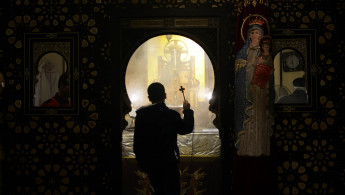New traditions and old concerns: Egyptian Copts celebrate Christmas
The Christmas season in Egypt spans a two-week period from December 25 to January 7, bringing much needed business to gift shops such as the one owned by Imad.
Imad's shop in the Heliopolis suburb of Cairo is full of Christmas trinkets for sale and is beautifully adorned with Christmas-themed decorations.
When we were there, a young woman entered.
"Hello Imad, did you get me what I asked for?"
She had ordered a tree, flowers and Christmas decorations.
In truth, Christmas trees and lights are new to Egyptian Christians, a tradition they imported from the West after the French and then English occupations of Egypt.
Likewise, Coptic Churches influenced by Western churches introduced modern musical instruments into their traditional Christmas hymns and chants.
The Coptic Christmas follows 45 days of fasting, during which observing Copts abstain from animal-source foods.
So on Christmas Eve, they prepare sumptuous meals.
"It is a night of love and feasting," said Munira Izzat, a housewife who spoke to The New Arab.
Christmas Eve, meanwhile, is for family visits. Children receive presents, while many adults go to church to pray.
 |
We are people who love life, celebration, joy and good food! But we do not forget our religious duties either |  |
Labib added: "We pray for peace but the security measures in Egypt cause the most nuisance to us."
Atta Mikhael said: "We are people who love life, celebration, joy and good food! But we do not forget our religious duties either."
Samia Makram, for her part, said she buys new clothes for her children for Christmas Day, bakes cakes and invites her friends and neighbours.
She does not forget expatriated friends and relatives either, who are easier to contact thanks to social media, she said.
Shaker Jerjes, however, complained that Egyptian television ignores the occasion, and does little to highlight or celebrate the Coptic holidays and traditions.
The Coptic Christmas will continue to fall on January 7 until 2094, after which it will be celebrated on January 8 due to differences between Western and Eastern calendars.
Nervous celebrations
Police painstakingly searched more than 300 churches in the capital, Cairo, alone for explosive devices, according to police general Gamal Halawa.
Roadblocks were set up before churches nationwide and cars and motorcycles were temporarily banned from idling in front of them, he said.
Police targeted "any attempt to spoil the joy of the celebrations with decisive and firm action," Halawa added.
Militant attacks have multiplied after the military overthrew Islamist President Mohammed Morsi in 2013, spreading from the restive Sinai Peninsula and striking the mainland numerous times in recent months.
Some extremists in Sinai have pledged allegiance to the Islamic State group and claimed the downing of a Russian airliner that killed 224 people there last year.
 |
Egypt's Orthodox Coptic Christians strongly supported the removal of the first freely elected, but divisive leader. Ever since, Christian gatherings have been at a greater risk of attacks |  |
Egypt's Orthodox Coptic Christians strongly supported the removal of the first freely elected, but divisive leader.
Ever since, Christian gatherings have been at a greater risk of attacks.
Following Morsi's toppling, many Islamists claimed Christians had conspired with the military against them as attacks on Christian homes, businesses and churches surged south of Cairo.
"We have been late in restoring and fixing what has been burned. Everything will be fixed. Please accept our apologies for what happened," President Abdel-Fattah al-Sisi, who as military chief led Morsi's removal, told the Christian crowds at Cairo's St Mark Cathedral in a rare public apology and acknowledgement of the attacks.
Sisi, widely seen as a saviour by Christians, received a rock star greeting at the cathedral, the seat of the Coptic Orthodox Church.
Security forces apparently failed to contain the cheering, flowers-throwing crowds on Sisi's way out of the church, forcing them to turn back and leave from a different exit.
Outside St Mark, heavily armed black-clad troops flanked the massive cathedral, as journalists and guests passed through metal detectors and had their IDs checked numerous times before they were granted entry.
Metal detectors were also set up in most churches nationwide.
Wednesday's tightened security measures were in part a preparation for the January 25 anniversary of the 2011 uprising that toppled longtime autocrat Hosni Mubarak.
Officials including Sisi have voiced concern about attempts to mark the anniversary of the revolt with protests in recent weeks.
 |
Egypt's Orthodox Coptic Christians make up about 10 percent of the country's 90 million people but the Copts have long complained of discrimination |  |
Throughout history, Egyptian presidents never attended Christmas masses, making Sisi's visit this year, the second of its kind, doubly appreciated.
The grinning president was joined by Muslim cabinet members, prominent pro-state media personalities and public figures.
"He loves us and we love him," said homemaker Nahed Maged of Cairo, who watched the televised Mass from home.
"Previous presidents used to ignore us, but he comes to church, shows us respect and smiles."
Egypt's Orthodox Coptic Christians make up about 10 percent of the country's 90 million people.
The Copts have long complained of discrimination, which many say still exists even under Sisi.
"Nothing has really changed in terms of our rights and freedoms," said Michelle Labib, a Christian 45-year-old computer programmer in Cairo.
"It is annoying how they make him out to be a hero when our lives have not improved in any way."
Labib and others say the Christian gratitude for Sisi's removal of the Islamist Morsi amid mass protests against his rule has begun to wane.
The Christians widely mobilised against the ousted and currently jailed Morsi in the hope they would win equal standing with Muslims after his removal.
With agencies.



